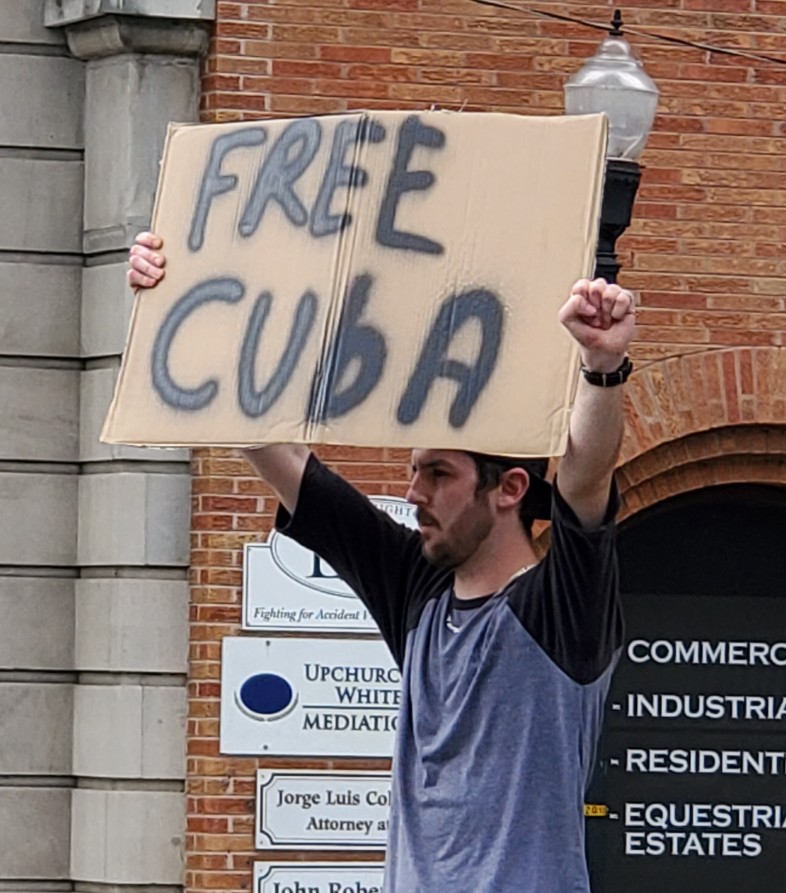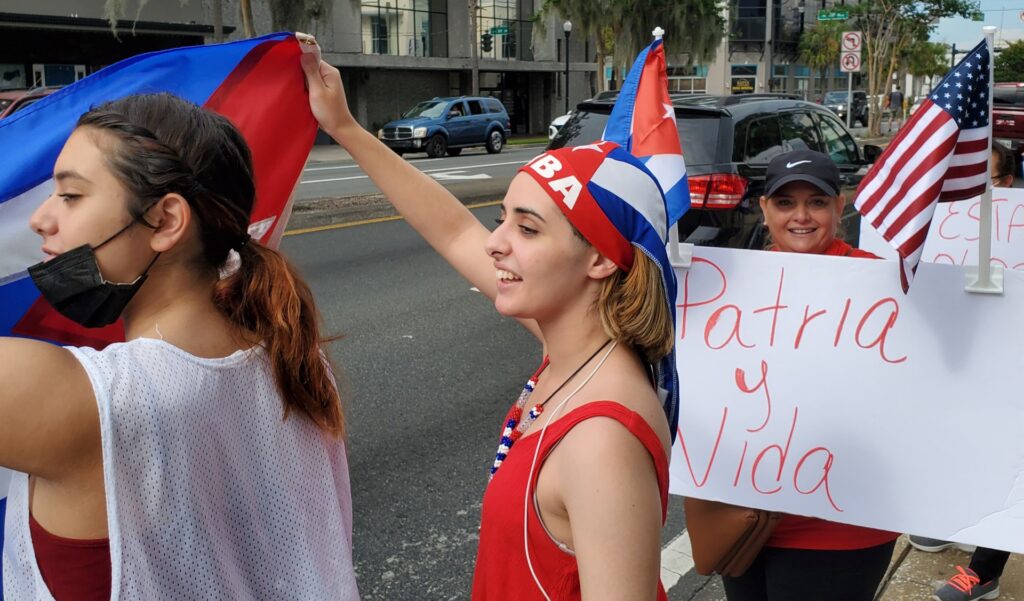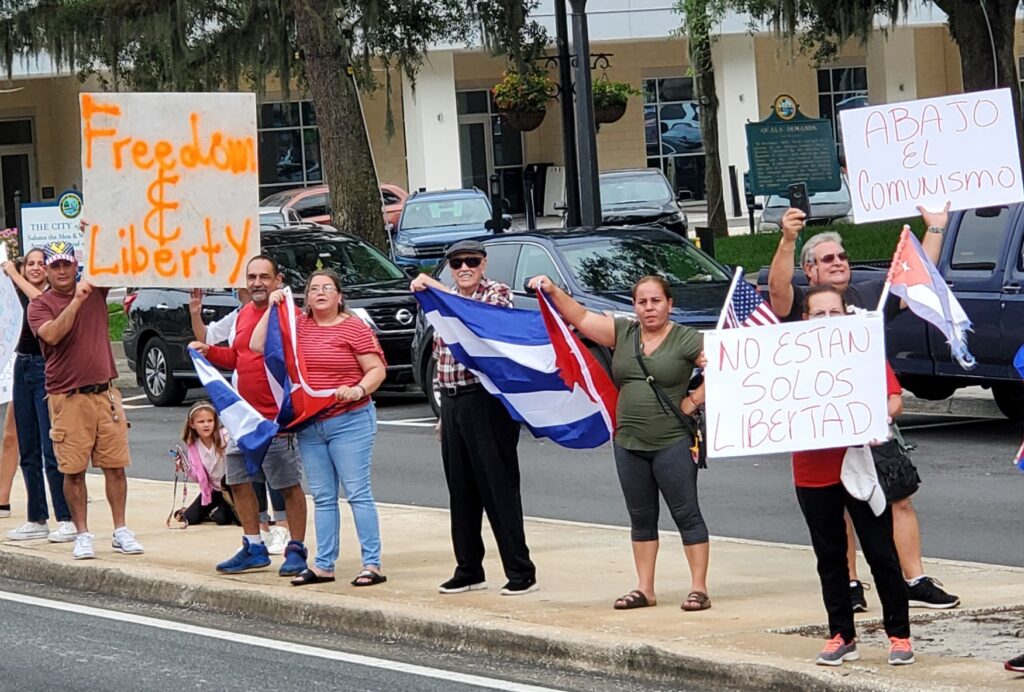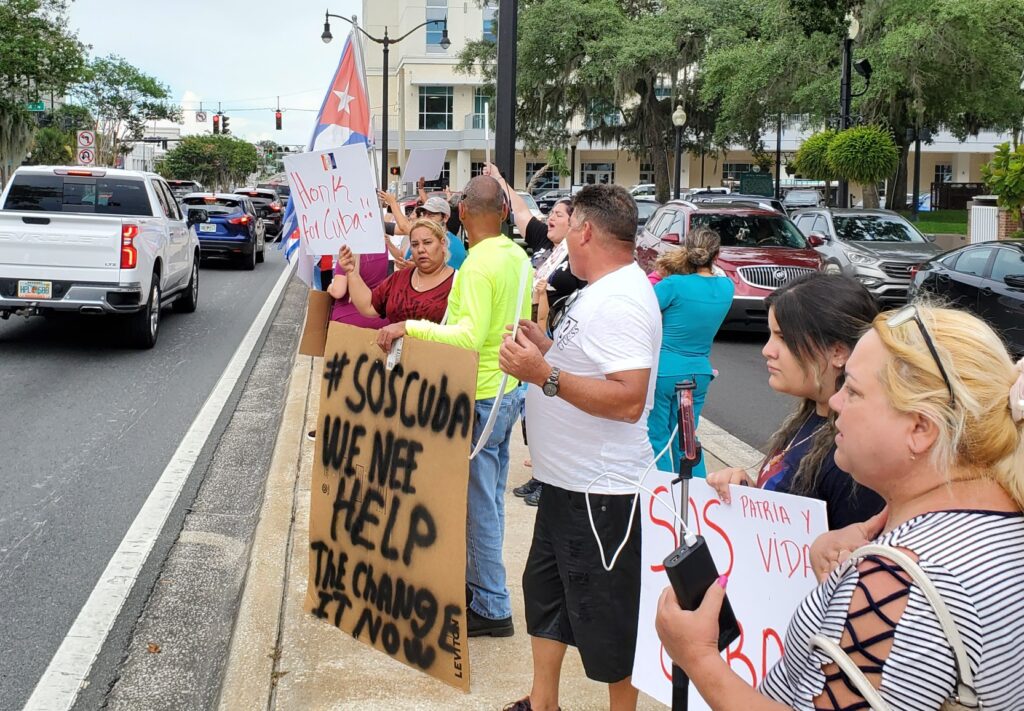Ocala residents hold rally in support of Cuban protestors


Sisters, Monica, left, and Jessica, center, join their mother Carolina Caparros, during a rally on the downtown square on Monday afternoon in support of protestors demonstrating in Cuba due to food shortages and high prices. [Carlos Medina/Ocala gazette]
The Ocala crowd, many of Cuban heritage, chanted for a free Cuba, a decades-old entreaty for democracy for the country that has been under communist rule since 1965.
“Libertad! Libertad!” shouted Jessica and Monica Caparros as they waved a Cuban flag. While the sisters are American, their mother, Carolina, was born in Cuba and lived under the communist state.
“It very bad. There needs to be a change,” said Carolina Caparros, who fled to the United States 25 years ago.
Mike Perdigon, who arrived in South Florida in 1994 after crossing the treacherous Florida straits in a raft, said the rally came about organically via social media connections among the local Cuban community.
“We got a permit. We all know each other. We all came out to support the Cuban people in their fight for liberty and freedom,” said Perdigon, who came to Ocala 20 years ago and hopes Cuba will one day be able to taste the freedom he has been able to enjoy.

People hold Cuban flags and signs in English and Spanish, including ‘Your not alone” and “Down with communism. The gathering in downtown Ocala was in support of Sunday’s protests in Cuba. [Carlos Medina/Ocala Gazette]
Passing cars honked their horns in support of the rally, which elicited even larger cheers from the crowd.
“We’re getting lots of support. Everybody knows the Cuban story. Your dependence on the government is absolute. You don’t even have the freedom of thought. I left because I wanted freedom. I wanted the ability to work and make my own way,” said Darwin Figueroa.
Sunday’s protests marked some of the biggest displays of anti-government sentiment in the tightly controlled country in decades. Cuba is going through its worst economic crisis in decades, along with a resurgence of coronavirus cases, as it suffers the consequences of U.S. sanctions imposed by former President Donald Trump’s administration.
Many young people took part in demonstrations in Havana. Demonstrations were also held elsewhere on the island, including in the small town of San Antonio de los Baños, where people protested power outages and were visited by President Miguel Díaz-Canel. He entered a few homes, where he took questions from residents.
Authorities appeared determined to put a stop to the demonstrations. More than a dozen protesters were detained, including a leading Cuban dissident who was arrested trying to attend a protest in the city of Santiago, 559 miles east. The protesters disrupted traffic in the capital for several hours until some threw rocks and police moved in and broke them up.
Internet service was spotty, possibly indicating an effort to prevent protesters from communicating with each other.
“We’ve seen how the campaign against Cuba was growing on social media in the past few weeks,” President Miguel Díaz-Cane said Monday in a nationally televised appearance in which his entire Cabinet was also present. “That’s the way it’s done: Try to create inconformity, dissatisfaction by manipulating emotions and feelings.”

At least two dozen people in downtown Ocala on Monday held signs in support of the protests that broke out in Cuba on Sunday. [Carlos Medina/Ocala Gazette]
In a statement Monday, U.S. President Joe Biden said Cuban protesters were asserting their basic rights.
“We stand with the Cuban people and their clarion call for freedom and relief from the tragic grip of the pandemic and from the decades of repression and economic suffering to which they have been subjected by Cuba’s authoritarian regime,” Biden said.
The U.S. urges the Cuban government to serve their people ‘’rather than enriching themselves,” Biden added.
U.N. deputy spokesman Farhan Haq on Monday stressed the U.N. position “on the need for freedom of expression and peaceful assembly to be respected fully, and we expect that that will be the case.”
The demonstrations were extremely unusual on an island where little dissent against the government is tolerated. The last major public demonstration of discontent, over economic hardship, took place nearly 30 years in 1994. Last year, there were small demonstrations by artists and other groups, but nothing as big or widespread as what erupted this past weekend.
In the Havana protest on Sunday, police initially trailed behind as protesters chanted, “Freedom!” “Enough!” and “Unite!” One motorcyclist pulled out a U.S. flag, but it was snatched from him by others.
“We are fed up with the queues, the shortages. That’s why I’m here,” one middle-age protester told The Associated Press. He declined to identify himself for fear of being arrested later.
Later, about 300 pro-government protesters arrived with a large Cuban flag, shouting slogans in favor of the late President Fidel Castro and the Cuban revolution. Some assaulted an AP videojournalist, smashing his camera. AP photojournalist Ramón Espinosa was then beaten by a group of police officers in uniforms and civilian clothes; he suffered a broken nose and an eye injury.
The demonstration grew to a few thousand in the vicinity of Galeano Avenue and the marchers pressed on despite a few charges by police officers and tear gas barrages. People standing on many balconies along the central artery in the Centro Habana neighborhood applauded the protesters passing by. Others joined in the march.
About 2 1/2 hours into the march, some protesters pulled up cobblestones and threw them at police, at which point officers began arresting people and the marchers dispersed. AP journalists counted at least 20 people who were taken away in police cars or by individuals in civilian clothes.
Although many people tried to take out their cellphones and broadcast the protest live, Cuban authorities shut down internet service throughout the afternoon Sunday.
On Monday, Cuban authorities were blocking Facebook, WhatsApp, Instagram and Telegram, said Alp Toker, director of Netblocks, a London-based internet monitoring firm.
“This does seem to be a response to social media-fueled protest,” he said. Twitter did not appear to be blocked, though Toker noted Cuba has the ability to cut it off if it wants to.
The Associated Press contributed to this report.





